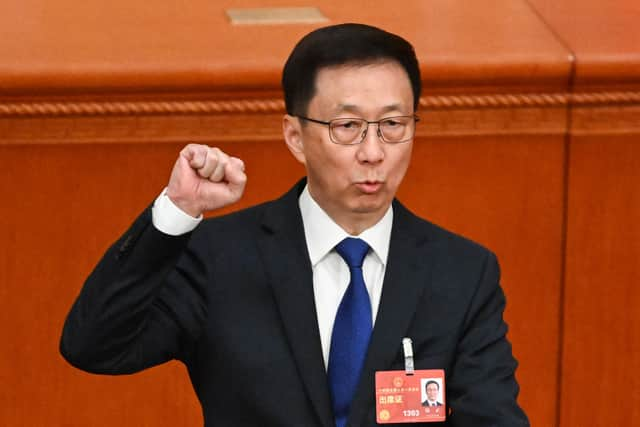Han Zheng: China coronation invite explained - why has vice president’s invite caused controversy?
and live on Freeview channel 276
China’s vice-president’s attendance at the King’s coronation is evidence that the global power does not give "two hoots" about the UK, according to the last British governor of Hong Kong.
Lord Patten criticised aspects of the government’s current approach to China, claiming that the choice to send Han is a reflection of how China views the United Kingdom.
Advertisement
Hide AdAdvertisement
Hide AdHan was recently named as President Xi Jinping’s deputy and will represent China at the royal occasion. However, he has been accused of leading a crackdown on freedom in Hong Kong.
“It doesn’t say anything bad about the British Government in particular, and of course it’s got nothing to do with the King and I’m sure it won’t cast clouds over what I imagine will be a very happy occasion,” Patten told BBC Radio 4’s World At One programme.
“But it does give an indication of what the Chinese Communist Party actually thinks about us because, while he may or may not be a significant figure in Xi Jinping’s court, he was actually the guy responsible for policy on Hong Kong.”
Many world leaders, dignitaries and senior officials from all over the globe will travel to London for the coronation on Saturday 6 May, including the vice president of China. But who exactly is Han Zheng, and why has his invitation stirred such debate.
Who is Han Zheng?


Advertisement
Hide AdAdvertisement
Hide AdHan Zheng is a Chinese politician who currently serves as the Vice President of the People’s Republic of China. He is considered to be one of the most powerful figures in the Chinese government, and is known for his expertise in urban development and his efforts to modernise China’s cities.
He is also recognized as a key figure in China’s economic policies and has been instrumental in promoting foreign investment in the country, but like many high-ranking Chinese officials, he has been criticised for his role in promoting and enforcing the Chinese government’s policies on press and civil freedoms, which are often viewed as restrictive and repressive.
One of the main criticisms against him is his involvement in the censorship of the media in China. As the former Party Secretary of Shanghai, he was responsible for overseeing the city’s media and is believed to have played a key role in suppressing critical coverage of the government.
Han has also been accused of overseeing the arrests and imprisonment of journalists and bloggers who have been critical of the government, and has also been criticised for his role in the government’s crackdown on civil society and human rights activists.
Advertisement
Hide AdAdvertisement
Hide AdUnder his leadership in Shanghai, many human rights lawyers and activists were arrested and detained, and the city’s civil society organisations were subject to increased scrutiny and restrictions. Additionally, Han has been criticised for his role in promoting China’s social credit system, which has been criticised for its potential to restrict individual freedoms and limit civil liberties.
Why has his invitation caused controversy?
The invitation for Han has drawn harsh criticism from some senior Tories, including former leader Sir Iain Duncan Smith.
Between 2018 and March of this year, Han oversaw Beijing’s affairs in Hong Kong. During that time, Beijing implemented a national security law in response to large-scale protests in the city, stifling opposition and criminalising dissent.
The action strained ties with the UK and prompted the establishment of a visa program that permits Hongkongers to visit Britain. The UK says that China continues to violate the 1984 Sino-British Joint Declaration, which obligates it to protect Hong Kong’s high level of autonomy and fundamental freedoms.
Advertisement
Hide AdAdvertisement
Hide AdHong Kong was transferred from the UK to China in 1997 with the understanding that Beijing would uphold Western-style liberties within the framework of "one country, two systems."
Lord Patten said: “You can’t ignore the fact that he’s there, and it’s a stick in the eye for 140,000 or more Hongkongers who are in exile here with the help of the BNO passport scheme.
“And also I think it’s an indication of the fact that, however much you grovel to China, however much you try to give them face, they don’t give a toss about giving us face because they could have sent lots of other people.
“There are, after all, 1.4 billion of them and they chose to send the guy who’s responsible for breaking their word about Hong Kong. If it wasn’t deliberate, then it shows how casually they actually treat us anyway.”
Comment Guidelines
National World encourages reader discussion on our stories. User feedback, insights and back-and-forth exchanges add a rich layer of context to reporting. Please review our Community Guidelines before commenting.
